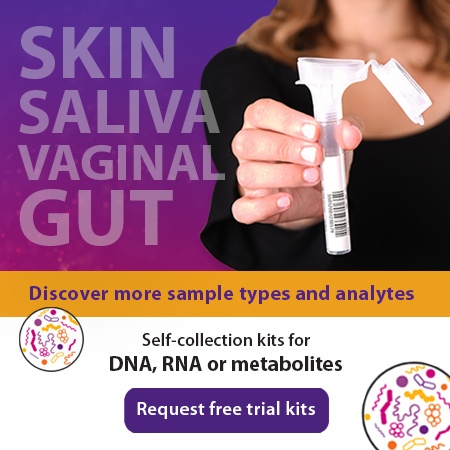2018-09-25
 We had the opportunity to sit down with Aaron Del Duca, our VP Technology and Microbiome Program Lead to discuss a few trends in the microbiome field he’s most excited about. Aaron has spent the past 4 years engaging with scientists in academia and industry to understand what the biggest constraints to discovery are, and sharing insights and best practices at microbiome conferences and with standards organizations around the globe. Below, we’ve condensed Aaron’s take on five exciting developments and on-going challenges in the microbiome space.
We had the opportunity to sit down with Aaron Del Duca, our VP Technology and Microbiome Program Lead to discuss a few trends in the microbiome field he’s most excited about. Aaron has spent the past 4 years engaging with scientists in academia and industry to understand what the biggest constraints to discovery are, and sharing insights and best practices at microbiome conferences and with standards organizations around the globe. Below, we’ve condensed Aaron’s take on five exciting developments and on-going challenges in the microbiome space.
Holistic multi-omics approaches and improved lab methodologies
Microbiome research is helping us answer questions we were previously incapable of answering. The real drivers are the convergence of sophisticated informatics tools, scalable multi-omics analytical platforms and systems biology thinking. This area is incredibly ripe for discovery. By interrogating the human genome, the metagenomes of our microbial co-habitants, and enriching our data sets with other ‘omes’, we can go from phenotypes to biomarkers to mechanisms much faster. It’s easy to describe in principal, but very challenging to implement in practice. That’s why it’s a great time to be developing tools and platforms for the scientific community.
Additionally, microbiome researchers are now looking at more than just bacteria. Viruses, fungi, and eukaryotes are critical to a functioning ecosystem. Since some of these organisms are complicated and difficult to study with traditional wet laboratory tools, they were historically considered ‘edge cases’ that many researchers avoided. Today, these methodologies have improved to the point where they’re reproducible and fully capable of generating meaningful data regarding these microorganisms.
An ecosystem of collaborations among academia, industry and study participants
Industry and academia are closely collaborating in the microbiome space. Many consumer goods companies, nutrition companies and food and beverage companies are supporting microbiome research within their own product development labs and fostering exciting new ventures. They are using research data to develop better products, new business models, tighter relationships and more personalized products. In addition to the reciprocal relationship between the data-producers (academia) and data-consumers (industry), we need to consider the importance of the study participant. Study participants need to have an intuitive, comfortable, highly reproducible sample collection experience – and with gut microbiome studies there can be a stigma associated with fecal sample collection that can adversely affect subject recruitment and compliance rates. This is an area where an easy, validated collection kit, such as the OMNIgene•GUT kit, is adding value. The study participant feels comfortable participating, the data-producer collects high-quality data, and the data-consumer trusts the final study results. Validated collection kits hold a unique and an enabling value position for each of these stakeholder groups – which is certainly fostering collaboration and discovery.
Global participation encourages ever-expanding use cases for microbiome innovation
One of the interesting aspects of microbiome research is how broadly applicable and omnipresent it is to so many fields globally. This is not solely a North American-centric research phenomena - the international community is really broadly involved. There are research projects happening on every continent!
Furthermore, microbiome research spans many varied domains and, on the metagenomics side, the indications are steadily growing. Previously, we conceptualized the gastrointestinal tract, immune system, and nutritional science as disparate areas of study. Recently, however, the boundaries across these disciplines are fading as more unifying principles emerge from researching the microbiome. The most interesting discoveries emerge from the union of adjacent fields of study!
Transformative research
If you think of the classic pharmaceutical company drug-development model – it takes many years and billions of dollars to move a novel therapeutic from the drug discovery stage to the post-market surveillance stage. Attrition rates between Phase 1, 2 and 3 can be as high as 50%. Conversely, there are a number of start-up microbiome companies that have successfully moved from proof-of-concept to late-stage clinical trials, in significantly less time and for a fraction of the cost. A few examples in different microbiome market segments are Vedanta Biosciences, Seres Therapeutics and Indigo Ag.[1] [2] [3]Starting the drug discovery process in humans, and accelerating discovery with c data science and systems biology is radical. This transformative approach is changing the drug discovery landscape, allowing new entrants and ultimately showing signs that new therapeutics and useful products can be brought to the patients and consumers that need them faster and with reduced risk
Challenges in the microbiome space
Since microbiome research is rapidly evolving and permeating into many different areas, it is not without its challenges. Here are a few examples where refinement is needed:
- Improved diagnostic tools
- Well-designed, appropriately-powered studies.
In order for microbiome-based research to scale and solve real-world problems, tools and methods suitable for diagnostic use need to be streamlined, validated and quality controlled. This is where industry and academia can really work together to make magic happen. Through partnerships and open innovation, biomarkers, targets and tools discovered in academia can be refined with industry know-how… and vice versa!
For many reasons, such as a disparity of available funds, many studies are under-powered. Biostatisticians assume perfect samples when they estimate effect sizes and run power calculations, which can lead to costly re-work downstream. One way to mitigate this issue is by improving sample quality. Proper stabilization at point-of-collection reduces the noise from sample degradation and enables comparable discovery power from fewer subjects than would be required if samples are not properly stabilized. Ultimately, however, until we figure out how to longitudinally engage large cohorts and diverse demographic groups, we’re not going to see all the insights and nuanced findings that are vital to understanding the big picture. We need to have the scope and discovery power of a study like the ‘All of Us’[4] project in the human genetics arena, but for the microbiome.
Today is the most exciting time to be a microbiome researcher. Aaron predicts tomorrow will be even more exciting.
We’d like to sincerely thank Aaron Del Duca for sharing some of his insights. What did you think of this article? We’d love to hear your thoughts in the comment section below. If you’d like more information regarding any of our microbiome collection kits, please contact us at info@dnagenotek.com.
References:
[1] Vedanta Biosciences, Inc. (2018). Vedanta Biosciences, Inc. [Online] Available at: https://www.vedantabio.com [Accessed 17 Sep. 2018].
[2] Seres Therapeutics. (2018). About Seres | Seres Therapeutics. [Online] Available at: http://serestherapeutics.com/about [Accessed 17 Sep. 2018].
[3] Indigo Ag. (2018). Indigo Agriculture | Plant Microbiome Technology. [Online] Indigoag.com. Available at: https://www.indigoag.com/ [Accessed 17 Sep. 2018].
[4] nih.gov. (2018). Program Overview - All of Us | National Institutes of Health. [Online] Available at: https://allofus.nih.gov/about/about-all-us-research-program [Accessed 17 Sep. 2018].


